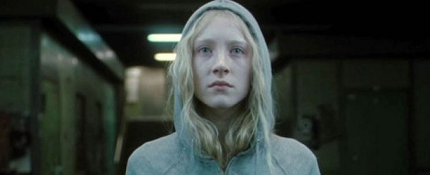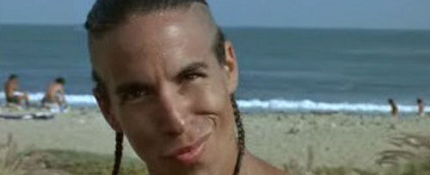 I must be becoming "the man."
I must be becoming "the man." Exit Through the Gift Shop opens with a montage of graffiti from all over the world. Some of it artistic, some simplistic, most of it either meaningful politically or humorous. Suffice it to say, the crowd ate it up, especially the guy behind me that over-laughed at everything in his louder-than-everyone-else's laugh. Me, I was busy feeling mixed emotions. Yes, there was merit of some fashion to nearly all of it, but I couldn't quite shake the knowledge that all of it was illegal, and some of it destructive. I don't particularly care that the act is illegal or that those committing it are by-and-large anti-police; I'm not necessarily, but that's their prerogative. However, most of the places where graffiti is placed is not owned by the government: billboards, corporations, individuals, etc. Blighted they may be, but vandalism is vandalism regardless of how beautiful or purposeful is may be. Their acts lose meaning via the medium.
************
I didn't particularly want to see Gift Shop. It's directed by a 'street artist' named Banksy; I'd read a bit about him, and was turned off by his anonymous nature. He's essentially The Riddler - he goes by a pseudonym, masks his voice and covers his face. This smacked of pretension, and I was having none of it - "oooh, I'll create a mystique and garner interest by virtue of being anonymous."
While there still may be some truth to that, after being educated a bit more about what Banksy does and how he does it - and most importantly, how talented he is at doing it - I've come around on him. The man may be many things, and I still have many questions about the way he goes about doing what he does (Example: If he and his work are anonymous, how come everyone seems to know when a new piece of work by him is unveiled? That doesn't seem very anonymous.), but I respect what he's doing and his skill. The man is a chronic shit-starter and pot-stirrer, and while you might not agree with all of his stances, a scan of the "movements" associated with him on Wikipedia prove to be key populist buzz words in today's political climate:
* Anti-capitalism
* Pacifism
* Anti-War
* Anarchism
* Atheism
* Anti-Fascism
************
However, Exit isn't about Banksy. Not really, anyway. It's interest lies in answering the question, "What makes an artist?" Specifically, about a man named Thierry Guetta, a former amateur filmmaker who gained inroads with street artists by virtue of obsessively following them around documenting their work. It's clear from the start that Guetta is a man troubled by his past, most effectively demonstrated by the nature of his filmmaking. He became fixated on documenting everything in his life after losing his parents at a young age, and his purpose is to document and document only. Finished videotapes are barely (if at all) logged, placed in a box for god-knows-what endgame.
He's also a terrific/terrible salesman/bullshit artist, and he managed to sell the artists he followed around (among them: Obama "Hope" artist Shepard Fairey) that his mountains of footage would lead to an eventual film. In time, after he eventually hooked up with Banksy, he actually did cull together footage, which he showed to the mysterious Brit. Suffice it to say that it was a nightmare.
This is when Gift Shop becomes what it's really about - Guetta's transformation from filmmaker to film subject, as Banksy decrees to him to "go make art," and so he does, all the while now being the star of Banksy's show. Guetta becomes a street artist himself, adopting the moniker Mr. Brainwash, and eventually soars to heights he probably never thought possible himself.
Hence, the "What makes an artist?" question - Guetta, from all that we're shown, is clearly not one. He seems a master at delegating and inexplicably is able to fund his endeavors and employ a cast of tens, yet there doesn't seem to be any more ounces of creativity in his body than in that of the average Joe's. And yet, he is undeniably successful, which perplexes and confuses the Bankys and Faireys of the world.
For his part, Banksy at least comes off looking good; there remains a question of authenticity with the film, but taken at face value (what face we can see, anyway), he's a smart smart-ass who is much wiser than you might believe. He's bewildered by Guetta's success more than anything, and saw the opportunity to profile a true character and tell a good story, all the while upping his own value in the process. On top of that, it's clear that, unlike some of the street artists, he actually creates almost all of his own beautiful work and his talents cannot be questioned.
Which is where the hypocrisy of Fairey comes in. This is a man whose stock in trade is re-purposing the art of others - juxtaposing it in interesting ways - and getting famous for it. He might have an eye for what works and/or a sense of what the people want, but he's no artist in the traditional sense any more than I am when "creating" my "Sequels that Won't Happen" posters. For him to call out Guetta for doing the same thing that he does is a really hard pill to swallow.
Fletch's Film Rating:
 | Expectation: "You seem a decent fellow. I hate to kill you." |
 | Reality: "Darn tootin." |
| LAMBScore: |
 |


























4 people have chosen wisely: on "Fletch's Film Review: Exit Through the Gift Shop"
Aw you totally are becoming The Man! I was in awe at the opening scenes of this film because I love seeing artists at work, especially street artists. But of course legal/defacement issues are a natural thing to come up.
Also, I have to disagree about Fairey. He's overrated, that can't be denied, but he does create some of his own images and designs. A lot of his images are re-purposed, true, but that's a very common artistic practice that I would argue doesn't necessarily relate to creativity.
I had no issues with Fairey until he started questioning whether or not Guetta was an artist. I don't consider Guetta much of an artist since he's not even the one doing the re-purposing (he has flacks for that), but I didn't get famous doing just that.
Fairey may very well create some of his own work - and it may be good - but that's certainly not where he made his name. It just reeked of the pot calling the kettle black. In my book, Banksy is allowed to level those accusations, but not Fairey.
Some street artists are very, very creative, not only those that create, but even in having the knowledge of what to put where and how to push the right buttons. That, I respect, but yeah, I couldn't get over thinking how pissed I'd be had they done that to a building of mine. And then there's also the fine line between street art and plain old graffiti.
What I was hoping - dying - to see was for some street artist to put something up at Banksy's show. Were I one (and in LA), I most definitely would have attempted something like that. Like him or not, that would have been a tremendous medium to do such a thing, and I think Banksy would even appreciate it.
So... it's a documentary directed by a street artist about a guy who attempts to make documentaries about street artists.
That's almost more confusing than Inception.
Nick - you're almost there.
"So... it's a documentary directed by a street artist about a guy who attempts to make documentaries about street artists."
"...who becomes a street artist."
Post a Comment